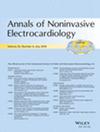Arterial Stiffness and Markers of Atrial Myopathy
Abstract
Background
Arterial stiffness, measured using carotid-femoral pulse wave velocity (c-f PWV) and heart rate-corrected augmentation index (Aix75), is associated with cardiovascular disease, and in some studies incident atrial fibrillation (AF). In this cross-sectional study, we aimed to investigate whether arterial stiffness is associated with markers of atrial myopathy, which refers to structural and electrical changes in the atria that indicate increased AF risk.
Methods
We included 1050 participants (age 57 ± 4.3 years, 47% males) from the population-based Swedish CArdioPulmonary bioImage Study with c-f PWV and Aix75 data. A random subsample (n = 331) underwent echocardiography. The association between arterial stiffness and atrial myopathy markers was studied using multivariable-adjusted negative binomial regression models for premature atrial complexes (PACs) on 24 h ECG, linear regression for P-wave duration and left atrial volume index (LAVi), and logistic regression models for abnormal P-wave terminal force in V1 (PWTFV1) and P-wave axis.
Results
Arterial stiffness was associated with fewer PACs: incidence rate ratio (IRR) 0.45 (95% CI: 0.31 to 0.65, p < 0.001) per 1 m/s increase in c-f PWV and IRR 0.66 (95% CI: 0.49 to 0.89, p = 0.01) per % increase in Aix75. There was no association between arterial stiffness and P-wave indices, OR 1.09 (95% CI: 0.85 to 1.40), p = 0.50 for abnormal PWTFV1, and β −0.003 (−0.10 to 0.09), p = 0.95 for P-wave duration, both per 1 m/s increase in c-f PWV.
Conclusions
Arterial stiffness, measured as either c-f PWV or Aix75, was associated with fewer PACs, whereas no association was found with P-wave indices. The association between arterial stiffness and atrial myopathy is complex and merits further study.


 求助内容:
求助内容: 应助结果提醒方式:
应助结果提醒方式:


